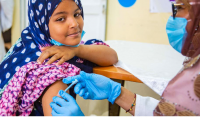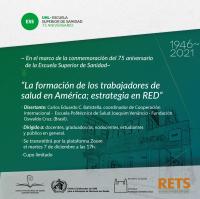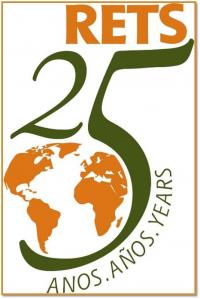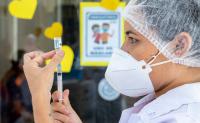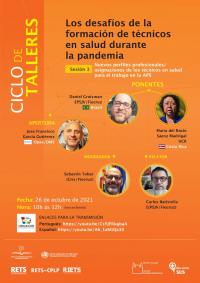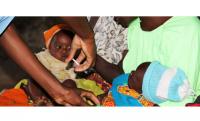You are here
News
-
01/12/2022 - Vaccination, testing of symptomatic individuals, and ensuring health workers are among first in line for additional vaccine doses are key to safeguard health systems. With COVID-19 infections accelerating in the Americas and the detection of the Omicron variant in at least 42 countries and territories in the region, the Pan American Health Organization Director Carissa F. Etienne has called on countries to ensure health workers have access to protective equipment and additional COVID-19 vaccine doses where available.
-
01/09/2022 - Though highly preventable and treatable, cervical cancer is the second most common cause of cancer death in reproductive-aged women globally, according to the UN health agency, kicking off Cervical Cancer Awareness Month.
-
12/11/2021 - The School of Health "Dr. Ramón Carrillo" (ESS) celebrated its 75th anniversary and, as a closing event, held a virtual lecture entitled "The formation of health professionals in America; a network strategy", by Carlos Eduardo C. Batistella, coordinator of International Cooperation of the Escola Politécnica de Saúde Joaquim Venâncio of the Oswaldo Cruz Foundation (EPSJV) in Brazil, one of the most important science and technology institutions in Latin America.
-
12/08/2021 - To celebrate the 25th anniversary of the International Network of Health Technicians Education (RETS), the Joaquim Venâncio Polytechnic School of Health (EPSJV/Fiocruz) held, on November 30th, the fourth workshop of the cycle 'The challenges of training health technicians during the pandemic', with the theme 'The future of networks in a globalized world: common challenges and shared solutions'. The workshops are being held in partnership with the International Network for the Education of Health Technicians (RETS) and its sub-networks: the Ibero-American Network for the Education of Health Technicians (RIETS) and the Network of Technical Health Schools of the Community of Portuguese-speaking Countries (RETS-CPLP). The initiative also has the support of the PAHO/WHO Subregional Program for South America, the Center for International Relations in Health (Cris/Fiocruz), and VideoSaúde Distribuidora of Fiocruz.
-
12/02/2021 - A total of 274 million people worldwide will need emergency aid and protection in 2022, a 17 per cent increase compared with this year, UN humanitarians said on Thursday. The amount is equivalent to “the world’s fourth most populous country”, Martin Griffiths, UN Humanitarian Affairs chief said at the launch of the 2022 Global Humanitarian Overview (GHO) in Geneva. The document, published annually by the United Nations and partners, includes 37 response plans covering 63 countries. It estimates that $41 billion is required to provide relief and protection to the 183 million people most in need.
-
12/01/2021 - While experts work to better understand the new WHO-designated “variant of concern,” Omicron, the Pan American Health Organization (PAHO) Director Carissa F. Etienne, called for increased vaccination and public health measures to ensure the best possible protection against the virus. "Vaccine inequity is prolonging the COVID crisis, and this is exactly what we’re seeing with the arrival of Omicron,” Dr. Etienne said.
-
11/19/2021 - The International Network of Health Technicians Education (RETS), whose Executive Secretariat is based at the Joaquim Venâncio Polytechnic School of Health (EPSJV/Fiocruz), completed 25 years of existence in August 2021. The commemorative event will take place on November 30th, from 2 pm to 4 pm (Brasília time), as part of the Workshop Cycle 'Challenges for the Training of Health Technicians in the Pandemic'. The objective of this fourth workshop is to discuss the future of networks in the post-pandemic world, and especially the training networks of health technicians. To what extent can the advance of virtuality favor the expansion of inter-institutional relationships in the context of international cooperation? How to deal with the phenomenon of fluctuating membership in the networks? How to favor the emergence of new protagonists and a multipolar perspective of contributions to the network? Participate with us!
-
11/03/2021 - As part of the work plan as a World Health Organization (WHO) Collaborating Center for the Education of Health Technicians, EPSJV/Fiocruz held, on October 26th, the third workshop of the cycle 'The challenges of training health technicians during the pandemic'. This time, the theme was the new professional profiles and attributions of health technicians to work in Primary Health Care. The initiative is carried out in cooperation with RETS and its sub-networks. Maria del Rocio Saenz Madrigal, MD, sanitarian and former Health Minister of Costa Rica, and EPSJV professor-researcher Daniel Groisman, a specialist in the training of workers for elderly care and public policies for aging, participated as debaters. The meeting was opened by José Francisco García Gutierrez, regional advisor for Human Resources in Health at PAHO/WHO. The workshop was presented by Sebastián Tobar (Cris/Fiocruz).
-
10/15/2021 - The third session of the Workshop Cycle 'Challenges for the Training of Health Technicians in the Pandemic', to be held on October 26th, from 10 am to 12 pm (Brasilia time), will discuss the new professional profiles/assignments of health technicians to work in PHC. The discussions will be based on the presentation of two experiences in this area. Former Costa Rican Health Minister Maria del Rocio Saenz Madrigal and professor and researcher Daniel Groisman, from EPSJV/Fiocruz, a specialist in the training of workers for the care of the elderly and public policies for aging, will participate as debaters in this workshop. The workshop will be opened by José Francisco García Gutierrez, PAHO/WHO Regional Advisor on Human Resources in Health. The event will be broadcast in Portuguese and Spanish.
-
10/06/2021 - The World Health Organization (WHO) is recommending widespread use of the world’s first malaria vaccine, in what the UN health agency’s chief described on Wednesday as “an historic day” for the decades-long battle against the deadly disease.


